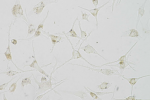Effect of tick saliva on maturation, migration and function of mouse dendritic cells
Skallová A., Kopecký J.
Tick saliva contains molecules, which suppress the host immune response thus facilitating transmission of tick-borne pathogens. The effect of tick saliva on maturation, migration and function of mouse dendritic cells (DC) was studied. The results showed that tick saliva inhibits the maturation of DC stimulated with ligands of Toll-like receptors. Saliva also reduced the capacity of these cells to present antigen to transgenic T lymphocytes. The most important results were achieved in vivo. Intradermal injection of tick saliva inhibited both maturation and migration of DC to draining lymph nodes and reduced their capacity to present antigen to specific T lymphocytes. Moreover, DC exposed to tick saliva polarised the development of T lymphocytes towards the Th2 subset. Considering the fact that DC play the key role in development of the immune response, alteration of their function by tick saliva apparently represents one of the main mechanisms of tick and tick-borne pathogen evasion of host immune surveillance.














